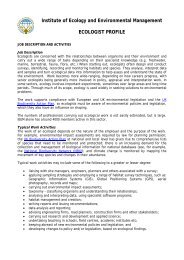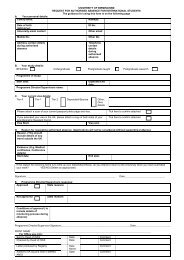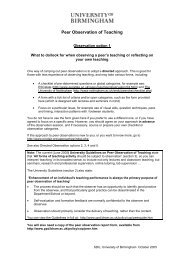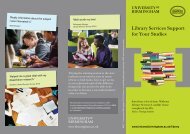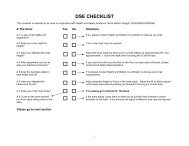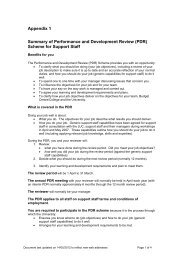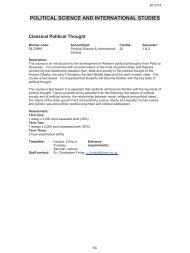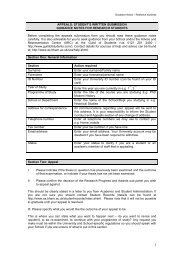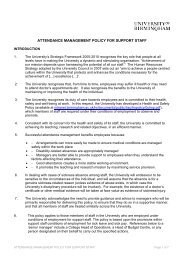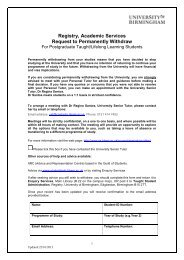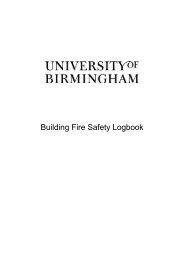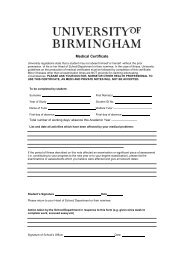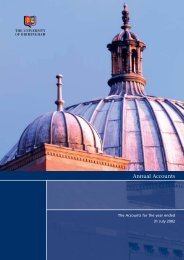Flexible working guidelines (PDF - 127KB) - University of Birmingham
Flexible working guidelines (PDF - 127KB) - University of Birmingham
Flexible working guidelines (PDF - 127KB) - University of Birmingham
You also want an ePaper? Increase the reach of your titles
YUMPU automatically turns print PDFs into web optimized ePapers that Google loves.
<strong>Flexible</strong> Working Guidelines• <strong>Flexible</strong> <strong>working</strong> for parents• <strong>Flexible</strong> <strong>working</strong> for carers <strong>of</strong> adultsintranet.birmingham.ac.uk/hr1
<strong>University</strong> <strong>of</strong> <strong>Birmingham</strong><strong>Flexible</strong> Working GuidelinesScope and Purpose1. These <strong>guidelines</strong> set out the criteria, process and conditions for making and consideringa flexible <strong>working</strong> request under the statutory right to request a flexible <strong>working</strong> pattern,as set out in the amended Employment Rights Act 1996.2. This information will be updated by Human Resources to reflect any changes to statutoryarrangements or <strong>University</strong> practices, and is correct as <strong>of</strong> April 2011.<strong>Flexible</strong> Working3. '<strong>Flexible</strong> <strong>working</strong>' describes any <strong>working</strong> pattern where the number <strong>of</strong> hours worked, orthe times when work takes place, varies from the standard practice for a post. It mayinvolve <strong>working</strong> fewer hours, such as part-time <strong>working</strong> or job share, or changing whenor where contractual hours are worked.4. <strong>Flexible</strong> <strong>working</strong> patterns can have benefits both for staff and for the <strong>University</strong>. Forexample, they can help staff achieve a better balance between their home and workresponsibilities, and enable departments to structure <strong>working</strong> patterns around the peaksand troughs <strong>of</strong> demand.5. Examples <strong>of</strong> flexible <strong>working</strong> patterns include:• Part-time <strong>working</strong>• Job sharing• Term-time only <strong>working</strong>• Compressed hours• Staggered hours• Home <strong>working</strong>Further information on different types <strong>of</strong> flexible <strong>working</strong> is attached at the end <strong>of</strong> thisdocument.<strong>Flexible</strong> Working at the <strong>University</strong>6. Under the amended Employment Rights Act 1996, staff have a statutory right to requesta flexible <strong>working</strong> pattern where they meet the following criteria:• They have a minimum <strong>of</strong> 26 weeks continuous service at the <strong>University</strong> at the time <strong>of</strong>applying; and• They are making the request in order:- to care for a child aged 16 or under; or- to care for a disabled child under the age <strong>of</strong> 18; or- to care for an adult; and2
• They are the mother, father, adopter, guardian, special guardian, foster parent orprivate foster carer <strong>of</strong> the child in need <strong>of</strong> care; or are married to, or the partner orcivil partner <strong>of</strong> the mother, father, adopter, guardian, special guardian, foster parentor private foster parent <strong>of</strong> the child; or• They are the spouse, partner, civil partner or relative 1 <strong>of</strong> the adult in need <strong>of</strong> care; orlive at the same address as the adult in need <strong>of</strong> care.Staff can make only one statutory request to work flexibly in any 12-month period.7. The <strong>University</strong> has a statutory duty to seriously consider flexible <strong>working</strong> requests thatmeet the above criteria, and may decline a request where there are recognised businessgrounds for doing so (see paragraph 20 below).8. Colleges and Budget Centres have the discretion to consider flexible <strong>working</strong> requestswhere the reason for the request is other than the statutory reasons outlined above.Such requests would still need to be considered in relation to the criteria set out inparagraph 20 below.9. Where a staff member has a disability and moving to a flexible <strong>working</strong> pattern has beenrecommended as a ‘reasonable adjustment’ to their <strong>working</strong> practices, an applicationunder these <strong>guidelines</strong> does not need to be made. Where a member <strong>of</strong> staff with adisability wishes to work flexibly to care for a child or adult, as specified in paragraph 6,that request should be made under these <strong>guidelines</strong>.Making an Application10. Staff who meet the criteria in paragraph 6 should make their request using the <strong>Flexible</strong>Working Application Form at the end <strong>of</strong> this document. Editable electronic copies <strong>of</strong> theform are also available from the form bank on the Human Resources website atintranet.birmingham.ac.uk/hr/leave/flexible/, and paper copies on request from yourHuman Resources team. The application form asks staff to state:• That they meet the qualifying conditions to request flexible <strong>working</strong>• The flexible <strong>working</strong> pattern they wish to move to• The date they wish it to be effective from• What effect the change will have on the staff member’s colleagues and department(for example, if hours are reduced, what will the effect <strong>of</strong> the person being absentduring those hours be?)• The staff member’s suggestions as to how these effects be dealt with11. The staff member is asked to provide this information to help the <strong>University</strong> seriouslyconsider their request. If the application is incomplete, the staff member may be askedto resubmit it. Once a flexible <strong>working</strong> arrangement has been agreed to, there is noautomatic right to change back to the old <strong>working</strong> pattern, unless this was agreed at thetime the application was made. As flexible <strong>working</strong> <strong>of</strong>ten involves reducing the number<strong>of</strong> hours worked, thought should be given to the effect this will have on salary, pension1 ‘Relative’ means mother, father, adopter, guardian, special guardian, parent-in-law, son, son-in-law,daughter, daughter-in-law, brother, brother-in-law, sister, sister-in-law, uncle, aunt or grandparent andstep-parent, step-son, step-daughter, step-brother and step-sister. Step-relatives are also included,as are adoptive relationships and relationships that would have existed but for adoption, ie a staffmember’s natural relatives.3
contributions, holiday leave and other benefits, all <strong>of</strong> which will be reduced in line withany reduction in <strong>working</strong> hours.12. The form should be submitted to the staff member’s line manager and a copy sent totheir Human Resources team. Ideally, the form should be submitted as far in advanceas possible, to ensure there is time for the request to be considered before the proposedarrangement needs to begin. For example, under the statutory timescales, it may takeup to six weeks for a request to be considered and a decision made (excluding time foran appeal to be lodged and heard, if necessary).13. The staff member’s manager will complete and return the tear-<strong>of</strong>f receipt on theapplication form to the member <strong>of</strong> staff to confirm their receipt <strong>of</strong> the application.Considering the Request14. The <strong>University</strong> has a duty to give serious consideration to a statutory flexible <strong>working</strong>request and whether it can be reasonably accommodated. Requests may be declinedwhen they cannot be accommodated on business grounds. When considering astatutory request, the <strong>University</strong> will seek to accommodate the staff member’s needs, butwill also need to balance these against the operational needs <strong>of</strong> the staff member’s teamor department.15. The staff member should be invited to a meeting with their line manager to discuss theirrequest within 28 days <strong>of</strong> the application being received. The purpose <strong>of</strong> this meeting isto discuss in further detail how the proposed arrangement could work in practice, and todiscuss alternatives if the request cannot be accommodated in its current form. If astatutory flexible <strong>working</strong> request can be agreed to on the basis <strong>of</strong> the application alone,it is not necessary to hold this meeting. In these cases, the staff member will beinformed <strong>of</strong> the decision in writing as outlined in paragraph 19 below. However, in themajority <strong>of</strong> instances, it would be expected that a formal meeting would need to be held.16. The staff member has the right to be accompanied at this meeting by a work colleagueor union representative. The line manager may request that a Human Resourcesrepresentative also be present at the meeting.17. If it is not possible to hold the meeting within 28 days <strong>of</strong> the application being received,the meeting may be held at a later date provided that the member <strong>of</strong> staff is consulted onthis and agrees to the extension. The agreement should be put in writing and a copysent to the staff member. 218. One outcome <strong>of</strong> the meeting may be that both parties agree flexible <strong>working</strong> beundertaken for a trial period before a decision on granting the request is made. This willinvolve a joint agreement that the statutory timescales for making a decision on theflexible <strong>working</strong> application be extended. This agreement should be put in writing and adate for a further meeting to discuss the request and outcome <strong>of</strong> the trial period agreed,as per the meeting details in paragraphs 15-17. The process from paragraph 19onwards will then continue to apply.2 If an application is sent to a line manager who is absent from work, an automatic extension applies.The 28-day period for the <strong>University</strong> to arrange a meeting with the staff member will begin when theline manager returns to work, or within 28 days <strong>of</strong> the application being submitted, whichever issooner.4
19. If the statutory request – or an alternative arrangement – is agreed to, writtenconfirmation <strong>of</strong> this will be sent to the staff member within 14 days <strong>of</strong> the meeting. Thiswill confirm the new <strong>working</strong> arrangement, the date it will begin from and, if appropriate,the date it will end.20. If – after giving the application serious consideration and looking at possible alternatives– it is felt that a statutory request cannot be accommodated on business grounds, thestaff member will receive written confirmation <strong>of</strong> this within 14 days <strong>of</strong> the meeting. Thewritten confirmation will include the business grounds for rejecting the request and howthey apply in that particular case. The staff member will also be informed <strong>of</strong> their right <strong>of</strong>appeal. Under the statutory right to request flexible <strong>working</strong>, the recognised businessgrounds for refusing a request are:• Burden <strong>of</strong> additional costs• Detrimental effect on the ability to meet customer demand• Inability to re-organise work among existing staff• Inability to recruit additional staff• Detrimental impact on quality• Detrimental impact on performance• Insufficiency <strong>of</strong> work during the periods the employee proposes to work• Planned structural changesAppeals21. Staff have the right to appeal within 14 days <strong>of</strong> receiving the <strong>University</strong>’s decision ontheir statutory flexible <strong>working</strong> request. The appeal should be in writing and should statethe grounds on which they are appealing against the decision. The letter <strong>of</strong> appealshould be sent to their Head <strong>of</strong> College or Budget Centre and a copy to their HumanResources team.22. An appeal meeting will be held by the Head <strong>of</strong> College or Budget Centre, or theirrepresentative, within 14 days <strong>of</strong> receiving the appeal letter. The staff member has theright to be accompanied at this meeting by a work colleague or union representative.The Head <strong>of</strong> College or Budget Centre may request that a Human Resourcesrepresentative be present at the meeting.23. Within 14 days <strong>of</strong> the meeting, written notification <strong>of</strong> the outcome <strong>of</strong> the appeal will besent to the staff member. If the request to work flexibly is accepted, this will confirm thenew <strong>working</strong> arrangement, the date it will begin from and, if appropriate, the date it willend. If the appeal is rejected, the letter will state the business grounds for this decisionand how they apply in that particular case.5
Types <strong>of</strong> <strong>Flexible</strong> WorkingThe term ‘flexible <strong>working</strong>’ encompasses a wide range <strong>of</strong> activities and types <strong>of</strong> <strong>working</strong>.Typically it involves some form <strong>of</strong> change to how much time is worked, when work isundertaken or where that work is undertaken, or a combination <strong>of</strong> these.a) Changes to how much time is worked• Part-time <strong>working</strong> involves <strong>working</strong> less than the standard full-time hours for a post.This may be by reducing the number <strong>of</strong> days worked per week, or by <strong>working</strong> a fullweek but reducing the number <strong>of</strong> hours worked each day. There are a number <strong>of</strong>variations on part-time <strong>working</strong>, such as job-share and term-time <strong>working</strong>.• Job sharing involves two people sharing the duties and responsibilities <strong>of</strong> one fulltimepost, on the appropriate pay scale and terms <strong>of</strong> employment designed for thatparticular job. The division <strong>of</strong> hours is <strong>of</strong>ten 50/50, although some job-sharearrangements involve other options (eg alternate weeks, mornings/afternoons, twodays/three days etc).• Term-time only <strong>working</strong> involves <strong>working</strong> only during <strong>University</strong> or school termtimes.Actual <strong>working</strong> hours during term time may be full- or part-time, and salariesmay be paid pro rata during the year or holidays may be treated as unpaid leave.Arrangements that involve reducing the number <strong>of</strong> hours worked will result in a reductionin salary and also other forms <strong>of</strong> remuneration and benefits, such as pensioncontributions and holiday leave.b) Changes to when work is undertaken• Staggered hours arrangements are when the staff member works set hours everyday, but the start and finish times are earlier or later than standard in order to supporttheir caring responsibilities. The staff member may still work their standard weeklyhours, or may combine this arrangement with a reduction in the number <strong>of</strong> hoursworked.• Compressed hours arrangements involve extending the number <strong>of</strong> hours workedper day, so that standard weekly hours are worked over 4 or 4.5 days instead <strong>of</strong> 5, orstandard fortnightly hours worked over 9 days instead <strong>of</strong> 10. Working arrangementswill still need to be compliant with the Working Time Directive, and staff consideringcompressed <strong>working</strong> hours should give full consideration to the impact <strong>of</strong> extended<strong>working</strong> hours on their work-life balance.• Seasonal/annualised hours are most effective in posts where there are significantvariations in workload from one time <strong>of</strong> the year to another. Working hours arecalculated over the period <strong>of</strong> a year, rather than a week, and work arranged inaccordance with the peaks and troughs <strong>of</strong> the workload. This results in staff <strong>working</strong>their standard annual hours, but with more weekly hours then standard being workedat particular times <strong>of</strong> the year and fewer at other times.6
c) Changes to where work is undertaken• Home <strong>working</strong>/remote <strong>working</strong> involves a staff member <strong>working</strong> from home for part<strong>of</strong> their standard <strong>working</strong> hours. Home <strong>working</strong> enables staff to focus on their work ina quiet environment and so is suited to work that requires sustained periods <strong>of</strong>concentration and minimum face-to-face interaction with other staff and customers. Itwill involve the provision <strong>of</strong> appropriate home computing and telephone equipment toenable effective communication, and any necessary health and safety checks willalso need to be undertaken. Managers and staff will also need to reach agreementon monitoring the output <strong>of</strong> work undertaken at home.7
<strong>University</strong> <strong>of</strong> <strong>Birmingham</strong><strong>Flexible</strong> Working Application FormNote to Staff:This form should be used to make a statutory application to work flexibly in order:• to care for a child aged 16 or under; or• to care for a disabled child under the age <strong>of</strong> 18; or• to care for an adult.Before completing this form, you are advised to read the <strong>University</strong>’s <strong>Flexible</strong> WorkingGuidelines to learn more about the right to request a flexible <strong>working</strong> pattern, and to ensurethat this is the right choice for you. Copies <strong>of</strong> the <strong>guidelines</strong> are available fromintranet.birmingham.ac.uk/hr/leave/flexible/ or on request from your Human Resources team.There is no automatic right to revert to your old <strong>working</strong> pattern, unless information on this isincluded in your application and agreed by your manager.As it may take up to six weeks for a request to be considered and a decision made(excluding time for an appeal to be lodged and heard, if necessary), you should ensure thatyour application is submitted well in advance <strong>of</strong> the date you wish the request to take effectfrom.The completed form should be passed to your line manager and a copy sent to your HumanResources team.Note to Managers:This is a formal application to work flexibly, made under the statutory right to apply forflexible <strong>working</strong> and the duty on employers to give such applications serious consideration.On receipt <strong>of</strong> this application, please complete and return the tear-<strong>of</strong>f strip at the end <strong>of</strong> theform to the staff member to confirm you have received the application.You then have 28 days after the date you received the application in which to hold a meetingwith the member <strong>of</strong> staff to discuss their request. Further information on the flexible <strong>working</strong>application process is provided in the <strong>Flexible</strong> Working Guidelines, available fromintranet.birmingham.ac.uk/hr/leave/flexible/ or on request from your Human Resources team,who can also advise you on this process.8
Personal DetailsName:School/Budget Centre:I would like to apply to work a flexible <strong>working</strong> pattern that is different to my current <strong>working</strong>pattern, under my right provided under section 80F <strong>of</strong> the Employment Rights Act 1996.I confirm that I meet the following criteria (please tick):And:Or:I have worked for the <strong>University</strong> continuously for the last 26 weeks.I have not made a statutory request to work flexibly under this right during the last 12months.I have responsibility for the upbringing <strong>of</strong> either a child aged 16 or under or adisabled child under the age <strong>of</strong> 18; andI am the mother, father, adopter, guardian, special guardian, foster parent or privatefoster parent <strong>of</strong> the child, or am married to, or am the partner or civil partner, <strong>of</strong> themother, father, adopter, guardian, special guardian, foster parent or private fosterparent <strong>of</strong> the child; andI am making this request to help me care for the child.I am, or expect to be, caring for an adult; andI am the spouse, partner, civil partner or relative <strong>of</strong> the adult in need <strong>of</strong> care, or liveat the same address as the adult in need <strong>of</strong> care; andI am making this request to help me care for the adult in need <strong>of</strong> care.If you are unable to tick the relevant boxes, you do not have a legal right to make a requestto work flexibly under the <strong>Flexible</strong> Working Guidelines. However, it may be possible to reachan arrangement through negotiation with your line manager.Proposed <strong>Flexible</strong> Working PatternPlease use this section to describe the flexible <strong>working</strong> pattern you would like to move to.a) Describe your current <strong>working</strong> pattern (eg days/hours/times worked).b) Describe the <strong>working</strong> pattern you would like to work in the future (egdays/hours/times worked).9
c) When would you like this proposed <strong>working</strong> pattern to begin from? (Theproposed date should allow adequate time for the application to beconsidered.)Date:d) What impact do you think your proposed <strong>working</strong> pattern will have on yourdepartment and colleagues?I think the change in my <strong>working</strong> pattern will affect my department and colleagues asfollows:e) How could any impact on your department and colleagues be dealt with?I think the effect on my department and colleagues can be dealt with as follows:Name:Signature:Date:Please forward the form to your line manager and a copy <strong>of</strong> it to your Human Resourcesteam.---------------------------------------------------------------------------------------------------------------------------Note to Manager - Please tear <strong>of</strong>f/photocopy this slip and return it to the staff member toconfirm your receipt <strong>of</strong> their application.<strong>University</strong>’s confirmation <strong>of</strong> receipt (to be completed and returned to the member <strong>of</strong>staff)Dear ………………………………….I confirm that I received your request to change your <strong>working</strong> pattern on………………..I shall be arranging a meeting to discuss your application within 28 days following this date.You have the right to be accompanied at this meeting by a work colleague or unionrepresentative.From ………………………………………..10



